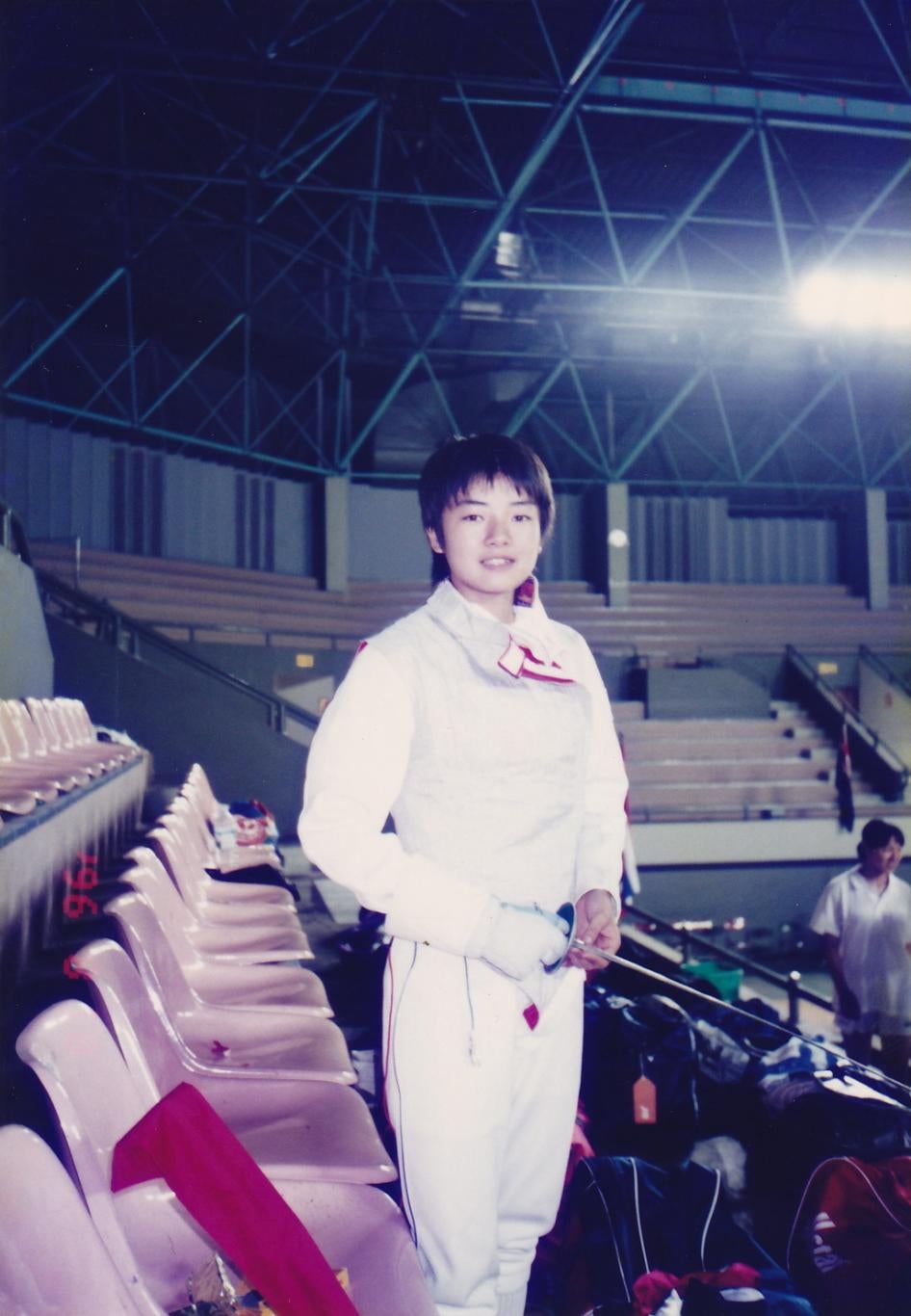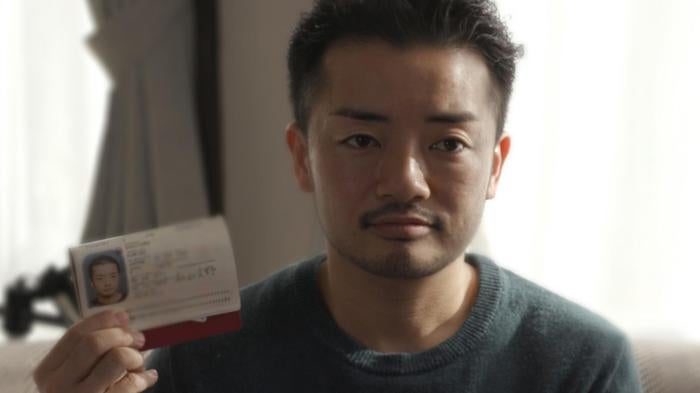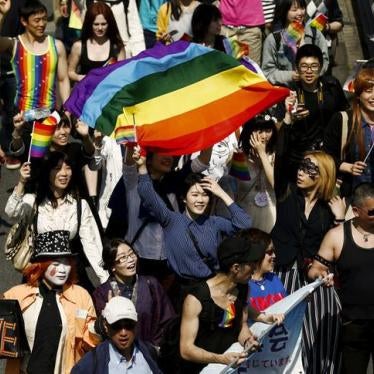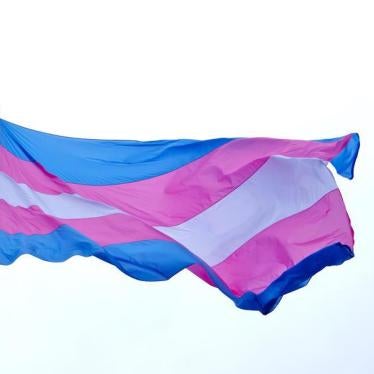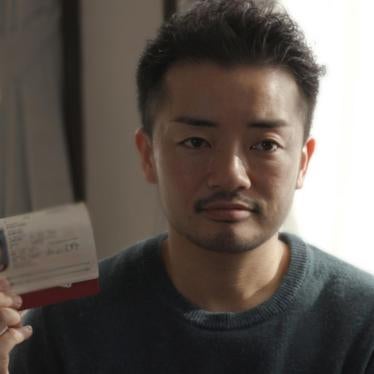This summer, Japan was supposed to be hosting the Olympics, but Covid-19 has pushed the event back a year. That delay doesn’t mean the country should also push back the conversation around equality in sports and in life. Human Rights Watch along with Athlete Ally and nearly 100 LGBT organizations led by the Japan Alliance for LGBT Legislation recently wrote a letter to the Japanese government asking it to introduce a nondiscrimination law ahead of the Olympics.
Sugiyama speaks with Human Rights Watch’s Philippa Stewart about coming to terms with his identity, the effect on his sporting career, and why Japan needs an anti-discrimination law.
Why did you start fencing?
I had been swimming since I was 3, but I didn’t like the swimming costume. I also tried kendo but at that time the girls on my team had to wear red and I didn’t like the [different] uniform. For fencing I saw no difference between female and male uniforms, so I liked that.
You made the national team and competed in the world championships. Did you feel like you’d found a home in fencing?
I didn’t really feel comfortable in the fencing world. Men were more respected than female fencers. Sports are very male-dominated. What’s strong is what’s valued. There is no place for minorities to fit in. If a male player got tired, he would be called a terrible slur for gay people.
I always had the fear of “What if my identity gets found out?”
When I became a member of the national team, I was 25. I was never the best on the national team – maybe I would make the top eight. I tried to compete well, but I also felt uncomfortable being a member of the female team.
[Even before my transition] I always had an internal conflict about whether I could continue fencing or not.
And all this affected your fencing?
People talk about psychology when you play sports. I don’t think I had psychological security. I was always weak at important moments. Fencing matches are up to 15 [points] and when it was 14-14 I almost never won. I don’t think it was because I wasn’t a good fencer. What’s important during these moments is you have to have the power to believe in yourself and I wasn’t confident in myself.
In practice, discriminatory words were flying around. I was uncomfortable with my body. Maybe I could have tipped those concerns away to win, but I think there was a relationship between my identity and how I fenced.
As you know, I fenced, too. When I was fencing well, there was a connection between my mind and my body, and everything felt in harmony. Do you think you had that feeling?
In Japanese there is an expression about heart, technique, and body all being in harmony. I don’t think those things were ever in sync for me.
Now I can understand why. But at the time I didn’t know what it would be like to come out and live openly.
When did you decide to come out?
The year after I became a member of the national team I was focused only on fencing. But I had a lot of injuries, so I didn’t make the next year’s team.
When I was on the team I couldn’t come out. My coach didn’t have a good understanding and I didn’t feel comfortable.
So, I thought I’d retire from fencing and retire my female body at the same time. After I retired, I started thinking about the transition and preparing for surgery.
How did the people closest to you react?
I was coming out little-by-little to people close to me. I had already told some of my friends in high school and college. In the fencing world it was the hardest to come out. I only told a few of my teammates.
I got reactions like “You will still be you.” Generally, people accepted who I am.
That might surprise people.
In Japan, Gender Identity Disorder [GID – the term applied to transgender people] has been seen as a disability, so people have to support you because you’re a person with a disability. That was one of the reasons I didn’t get a stronger negative reaction.
You appeared in a Human Rights Watch video showing people that being transgender isn’t a diagnosable disorder. Is Japan changing how they think about transgender people?
A little bit, but it hasn’t changed completely. At the time of my surgery (a decade ago) in Japan, there was no word “transgender.” People responded more in the way of “I’m sorry you have a disorder.”
But slowly the word “transgender” is becoming popular and it is being seen not as a disorder.
The situation is also different for transgender men than transgender women. Japan has a terrible gender gap. For transgender women, they have the identity of being transgender and being a female – so it is like being a minority multiplied.
When you go through your day, do you have things that happen to you that a cisgender person wouldn’t experience?
Right now, my day is the same as everyone’s – I stay home. I have a child, so I cook and spend family time at home.
In more normal times I have my own business running two restaurants. I also do 100 to 120 seminars a year and I run Tokyo Pride.
In terms of things I have to think about – I’ve been living with my partner for nearly 10 years and we have a child, but we’re both female on legal papers so our relationship isn’t recognized. If our child gets sick in the hospital, I wouldn’t be able to see them. That worry is always there.
You mentioned Pride. Why did you decide to get so involved in the parade?
Around the time I had my surgery, when I was about 28, I saw Pride as a demonstration by homosexuals that had nothing to do with transgender people.
When I became involved I wanted to move Pride away from being a demonstration and make it more of a festival that could reach more people and be open to a wider audience. Now I have done that, and I think I was able to contribute to positive change in Japanese society.
Japan will be hosting the Olympics next year – an event that’s meant to be about equality and solidarity. What do you hope the Olympics coming to Japan can achieve?
The word diversity is easier to say in Japan because of the Olympics. In Japanese society many things are decided by old [cisgender] men, and even they realize that everyone is talking about diversity because of the Olympics.
But the Olympics is only a start of something. We have to push and create new laws like the anti-discrimination law.
Structural discrimination is the problem. We have to make the structure equal.
We can’t look back and say: “Oh there was a big party, but nothing changed.” What we leave to the next generation is what’s important.
Japan still doesn’t have an anti-discrimination law. How would a law like that change your life?
In Japan, we aren’t making much progress towards people understanding what it means to be LGBT because of the absence of a law. At the same time, the need to have a law does not get recognized because of the lack of understanding about being LGBT. It is a vicious cycle.
I am always worried [in my daily life] because of the lack of law. A nondiscrimination law would bring us closer to a Japanese society where everyone can live with peaceful mind. I think that is extremely important not only for LGBT people but for all Japanese citizens.
Everyone is a minority in some way, whether you are LGBT or not. Together let’s create a society where everyone can live and feel secure.
What needs to happen in sports to become more inclusive and accepting?
In sports you play based on fair rules. I think athletes understand that currently, society is not fair. Athletes also know the power of people cheering for you.
Sports has a big influence on society so if the sports world changes, it becomes a catalyst for society to change. I would like as many athletes as possible to be a part of that.
What is one message you’d like people reading this to leave with?
I spoke about psychological security. If safety is guaranteed you can perform at your best. I don’t think I performed my best because of the lack of psychological safety. If you look at LGBT people living in Japan right now, that safety is also not guaranteed.
There’s so much untapped potential because of lack of security and safety. That is an area that needs a lot of improvement for Japan as a county, but also in the sporting world.
I want psychological security for everyone so everyone can be their best.

